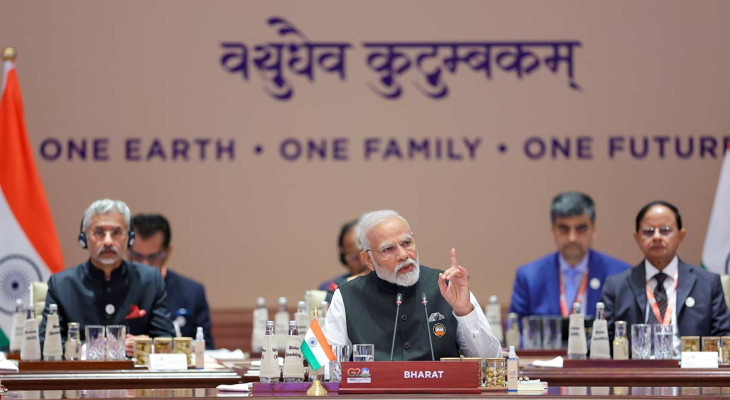Chips are digital diamonds: PM Modi
The Prime Minister Narendra Modi inaugurated the ‘Semicon India – 2025’, aimed at catalysing India’s Semiconductor ecosystem, at Yashobhoomi in…

PM Modi Presiding over the G20 Summit
India bids adieu to the historical 18th summit of G20 members on Sunday, resulting in successful bilateral meetings with the Global Leaders and the Chiefs of International organisations. The biggest takeaway from the summit is the inclusion of the African Union as a permanent member in the group. The group also produced a consensus document on the Russia-Ukraine conflict. The bloc criticised the actions, saying that no nation can harm the people and grab others’ territory forcefully but no one in the meeting directly condemned Russia for its actions. State representatives of America, India, and Saudi Arabia are planning to counter the border road initiative of China by setting up ports and rail links between the Middle East and South Asia.
On day one, the 55-member African Union officially became a permanent member of the G20 at the level of the European Union to make the group more representative. Until now, South Africa was the only nation from the African Continent to be a part of the G20 group. Joining the African Union would give the Global South more power in the G20 bloc, whereas the G7 countries have long played a dominant role. The move also comes after the BRICS, another grouping dominated by China and Russia, was expanded to include Saudi Arabia and Iran, which was seen as an attempt by Beijing to make it a possible alternative to the G20.
G20 leaders aiming to triple renewable energy capacity globally by 2030 agreed on the need to phase out inexhaustible Coal power but stopped setting big climate targets. The group did not present a plan to change existing policies and targets to achieve the goal of increasing the use of renewable energy sources. It also said it would cost $4 trillion a year to pay for the transition to green energy, but offered no option. The G20 negotiations have been closely watched ahead of this year’s COP28 climate summit in the United Arab Emirates.
Indian Prime Minister Narendra Modi presided over the G20 as a year-long opportunity to present India as an influential, diplomatic, and economic power. This indicates that the world’s most populous nation is ready for direct investment and trade flows. It also gave PM Modi a platform to improve his standing at home as he seeks a third term in elections in the coming months. Modi’s image was on G20 billboards across the capital and in the huge and elegant new conference venue. To his supporters, the successful outcome of the summit signalled that India’s great moment had arrived.
Jaishankar, Minister of External Affairs, highlighted that India’s presidency shows the world that Bharat is ready to shape global ideas and issues. Senior Congress leader and MP Sashi Tharoor praised the Government of India by saying, “G20 Summit is an achievement for Indian diplomacy.” He also praised Amitabh Kant, an Indian bureaucrat and G20 Sherpa for its efforts.
Advertisement